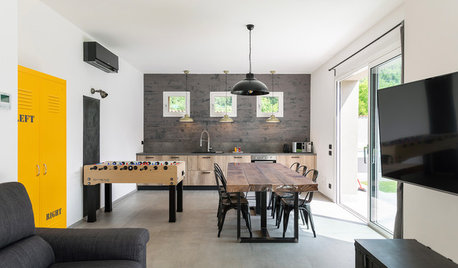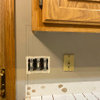The 6-Foot Rule
tyne
16 years ago
Featured Answer
Sort by:Oldest
Comments (19)
petey_racer
16 years agolast modified: 9 years agoarichard21
16 years agolast modified: 9 years agoRelated Discussions
Update - 30 foot rule
Comments (6)I am in/near cleveland and i can see it fine. looks great. warwick comet is one that really stands out imo but there seem to be more and more new ones that are getting a similar look now but still unique for now and you can always spot a s&s from far away...See MoreNosy Neighbor
Comments (10)I've spent the past 6 years growing 15' trees to give my family privacy from the eyes of neighbors. The women in our house felt uncomfortable being in their bikinis in the back yard that was overlooked by a neighbor's second-story bathroom window used by a family with 3 teenage boys. That was one of the reasons we rarely used our swimming pool and eventually got rid of it. If the original poster is an attractive female and the neighbor is a dirty-minded, lonely, old man that doesn't know how to use the Internet to get his voyeuristic kicks...then there's a simple solution while you're waiting 6 years for those privacy trees to grow. You could always wear massive, baggy, oversized clothing, a large hat, and dark sunglasses while you garden. If there is nothing for him to see that interests him, he'll eventually stop peeping and will hopefully discover the Internet. You could also turn the tables and become the aggressor as some women successfully do. Peeping toms are usually the shy ones, and they can become completely crushed when confronted. The fact that he has joked about it with you perhaps reveals that he himself feels guilty about it. Recently-retired people very often struggle with mental and emotional issues. Even if you completely screen your property with vegetation and fences, you haven't really solved the underlying problem, at least not permanently. All he needs is a new vantage point. Or a tiny hole in the fence. Or a hidden camera. The problem is more of a human problem than a landscape design problem....See More6 foot alcove, 5 foot tub
Comments (4)Thank you, everyone. I did a walk through with the construction supervisor and plumber yesterday and they voted for building the wall out along the edge so I'll have a one foot deep recess at the end of the tub. The plumber particularly said that he has redone a lot of bathrooms and pulled up rotten wood because kids get carried away and aren't careful about water spraying out at the end of an open curtain. Jejvtr, picture your niche area but with just a wall that lines up with the outside edge of the tub and leaves the rest of the area open so it can function as a seat or a wide shelf for products and bathing paraphernalia. We do have another bathroom that has an extra 6" at the end of the alcove and we're going to do something similar to your niche in that one. Heimert, I love your creative solution. If the construction was already done I would do that but I'm going for the permanent fix. Thanks...See Morewiring and code question
Comments (5)Sounds like you've hit most of the issues. Don't forget the in-use covers on the new outdoor receptacles. All you need for lighting is a switch somewhere in the room to turn it on. Putting a an additional (three-way) at the second entrance is not a bad idea but not required by the code....See Moretexasredhead
16 years agolast modified: 9 years agoRon Natalie
16 years agotyne
16 years agolast modified: 9 years agoterribletom
16 years agolast modified: 9 years agoarichard21
16 years agolast modified: 9 years agoitsunclebill
16 years agolast modified: 9 years agoterribletom
16 years agolast modified: 9 years agobrickeyee
16 years agolast modified: 9 years agocobraguy
16 years agolast modified: 9 years agoarichard21
16 years agolast modified: 9 years agojoed
16 years agolast modified: 9 years agobrickeyee
16 years agolast modified: 9 years agopetey_racer
16 years agolast modified: 9 years agoarichard21
16 years agolast modified: 9 years agocobraguy
16 years agolast modified: 9 years agoarichard21
16 years agolast modified: 9 years ago
Related Stories

MOST POPULARThe Polite House: On ‘No Shoes’ Rules and Breaking Up With Contractors
Emily Post’s great-great-granddaughter gives us advice on no-shoes policies and how to graciously decline a contractor’s bid
Full Story
PAINTING10 Rules for Your Next Painting Project
Take your next painting journey from ‘argh!’ to ‘ta-da!’ with these designer tricks
Full Story
DECORATING GUIDES11 Area Rug Rules and How to Break Them
How big should an area rug be? These guidelines will help you find the right size and placement
Full Story
PETSHouzz Pets Survey: Who Rules the House — Dogs or Cats?
New data shows that pets make people happy, and pet owners love spending big to return the favor
Full Story
BATHROOM DESIGNRoom of the Day: Geometry Rules in a Modern Master Bathroom
Careful planning pays off in this clean-lined bathroom with his-and-her vanities, a semiopen shower and a soaking tub
Full Story
REMODELING GUIDESKey Measurements: Recreation Rooms Rule
Planning to fix up the basement or build an addition for game tables? Learn what will fit and what you might want to include
Full Story
GARDENING AND LANDSCAPINGChicken Coops That Rule the Roost
These 8 chicken coops designed by Houzz users will have you clucking in admiration — and maybe even planning a henhouse of your own
Full Story
GARDENING GUIDES4 Ways to Break the Rules in Your Garden
For a more creative landscape design, take a different approach to planting
Full Story
HOUZZ CALLHouzz Call: Show Us Your 8-by-5-Foot Bathroom Remodel
Got a standard-size bathroom you recently fixed up? We want to see it!
Full Story
SMALL KITCHENSHouzz Call: Show Us Your 100-Square-Foot Kitchen
Upload photos of your small space and tell us how you’ve handled storage, function, layout and more
Full Story




arichard21